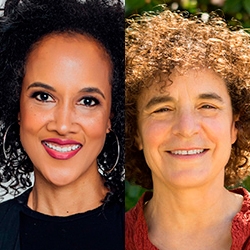

Search Results: resentment
-
Why is it so difficult to change our patterns even when we want to, even when we experience shame or despair about them? Arnina Kashtan offers some of the common pitfalls and concrete steps to overcome them in the future.
-
Trainer Tip: Have you ever noticed how often we back up when we find ourselves in a conflict? Or how much we try to pull away when someone is angry or in emotional pain?
-
Through your dialogues at home, where the stakes are often very high, you can increase your ability to meet the challenges of life everywhere with empathy, goodwill and authenticity. Please listen to this inspiring recorded telecourse with Miki Kashtan and learn how!
-
Learn when to use the two types of requests in the practice of Nonviolent Communication: Action Requests and Connection Requests. Both are important when working through conflict or difficult situations and for building connection.
-
Trainer Tip: It is true that we cannot fully understand other people until we understand ourselves. Gain understanding and healing through self-empathy within the Compassionate Communication process.
-
Trainer tip: NVC focuses on shared human values and needs, and encourages the use of language that increases good will -- plus avoidance of language that contributes to resentment or lowered self-esteem. It emphasizes taking personal responsibility for choices and improving the quality of relationships as a primary goal. For today, focus on making observations without moralistic judgment in at least two of your interactions.
-
When an entity or system has authority or power and mandates something we don't agree with we may submit or to rebel. If we submit, we give in or give up, often out of fear. If we rebel, we're in reactivity which may not help our cause, and reduce our power. This may result in others' resentment, anger, and pain. Gandhi and Martin Luther King didn't submit nor rebel. Instead, they were in choice and advocated for their cause.
-
- Find your voice in response to words you hear as racist
- Build bridges across significant differences of opinion
- Become a powerful ally for the racial justice movement
-
Distinguishing between needs and strategies to meet needs is crucial for solving conflict. For example, the need for peace can be met through various strategies beyond solitude or gratitude. Similarly, sex is a strategy. Sexual expression is the need behind it, and can be met in various ways to meet that need without having sex itself. Such flexibility can foster creativity and deeper connection, enhancing relationships.
-
Prioritize connection before solutions by understanding each other's needs first.
-
If you dread family gatherings because of family tensions, you can find ways to excavate through piles of hardened judgments and hopelessness, build on your inner strength, and engage with family conflicts with open-hearted curiosity, greater presence, and connecting with what really matters to everyone.
-
What parent hasn't experienced a surge of protectiveness when your child hurts their sibling? Our cultural training calls us to immediately take two roles: the judge, determining who was wrong and what the consequences will be, and the police, enforcing the consequences. These thankless jobs often result in frustration, resentment, pain, for all. Read on for an example of how empathy transformed a child's impulse to hit another child.
-
When someone behaves in a way that you may label convincing, cajoling, guilt-tripping, threatening, analyzing, or criticizing, you may be tempted to guess they have a "need" for control. Instead, name what this person is doing that isn't meeting your needs. If it is a true need your heart will have softened. If you feel resentment or resistance, you are likely making a judgment rather than guessing what they are needing.
-
This is an opportunity to explore/transform a limiting belief you have about yourself using what science is discovering about neurobiology. A limiting belief is simply an idea or thought we have about ourselves/life that we or others have affirmed over and over again – these ideas usually get in the way of living life fully.
-
Trainer Tip: Stating our observations, feelings and needs can still be heard as criticism if we don't follow it up right away with a specific, doable request. Ending your statement with a request for what you want can clarify the situation and reduce the chances that you'll be met with defensiveness. Read on for an example.
-
It's important to make requests specific and doable. Also, without a swift request immediately after we state our observation, feeling, and need in regard to the situation, the other person is left guessing what we want. Instead, a swift request can bring clarity and lessen the potential for the listener to become defensive or argue.
-
Trainer Tip: Punitive use of force stems from a belief that people behave in certain ways because they're bad, and that they need to be punished to mend their ways. One way to punish is to judge them. In contrast, protective use of force stems from a desire to prevent injury or injustice. It focuses on protecting people’s rights and well-being, not judging their behavior.
-
Susan Skye unpacks the need for respect, offering clarity for requests and personal experience.
-
Jim Manske demonstrates using NVC and self-connection to create sincere, healing apologies.
-
An interviewer shares his reaction to the term Nonviolent Communication after a workshop.

Quick Links
Subscription Preferences
Stay In Touch!
Looking for ways to keep up with NVC Academy news, get special offers, free resources, or words of inspiration? Here are five ways to stay engaged:




















